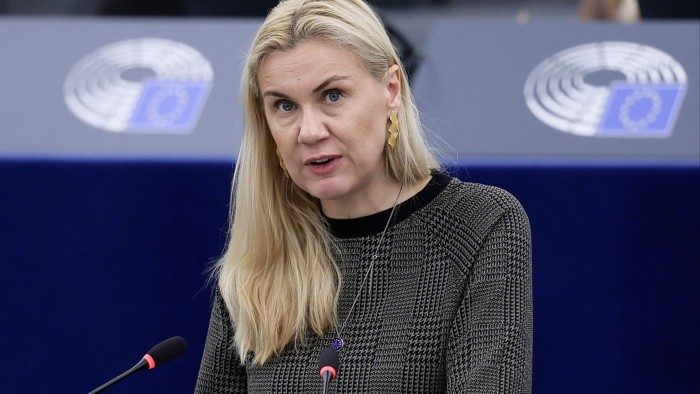The EU’s top energy official, who stepped down at the weekend during the handover to a new European Commission, has warned against a deal to replace Russian gas piped through Ukraine by labelling the imports as Azerbaijani.
European energy companies have been negotiating with counterparts in Ukraine and Azerbaijan to ensure that flows of gas to central Europe would continue after an agreement with Russia’s Gazprom to supply gas via Ukraine expires on December 31.
Under the agreement, Azerbaijan would deliver gas to the Ukrainian border, from where it could then be sent to Europe through a complex swap arrangement with Russia.
The main beneficiaries of this deal would be the Moscow-friendly governments of Hungary and Slovakia, which have defied the bloc’s efforts to wean itself off Russian gas following the full-scale invasion of Ukraine in 2022.
Kadri Simson, the outgoing EU energy commissioner, told the Financial Times that such a “swap” would simply result in Russian flows continuing but “pre-labelling” them as Azerbaijani. The arrangement was “totally unnecessary”, she said, as it was possible for European companies to buy Russian gas at the Ukrainian border themselves, she added.
EU countries have committed to stop buying Russian fossil fuels by 2027, but gas purchases are not subject to sanctions imposed by the bloc in response to Moscow’s war. European companies are still allowed to “negotiate with the Ukrainians and continue their purchase” of gas from Russia, Simson said.
Analysts have expressed concern that a sudden cut-off could raise prices in the depths of winter. European gas prices are more than double what they were in 2020, the last winter before Russia started to squeeze supplies in response to the EU’s support for Ukraine.
Gas flows reaching the EU through Ukraine account for about 5 per cent of the bloc’s total supplies, with Austria, Slovakia and Hungary being the main beneficiaries. Gazprom, however, halted supplies to Austria earlier this month after the Austria energy group OMV was awarded €230mn in an arbitration ruling against the Russian company.
Hungary has been negotiating new gas deals with Gazprom to increase supplies next year.
Ukrainian President Volodymyr Zelenskyy said in July that Kyiv was in talks with Azerbaijan to maintain gas flows through the war-torn country, despite the heavy Russian bombardments on Ukraine’s energy infrastructure.
But the likelihood of Ukraine remaining a transit country for EU-bound gas has faded as talks stall. Slovakian and Hungarian energy companies are exploring options to access gas from Azerbaijan via alternative routes.
Last month the Slovak gas company SPP signed a pilot contract with Socar, Azerbaijan’s state energy company, through Turkey and the Balkans.
The deal followed an inconclusive meeting between Slovakia’s Prime Minister Robert Fico and his Ukrainian counterpart to try to maintain flows via Ukraine.
If the pilot project with Baku works well, “significant contracts in the future are possible”, Vladimír Šimoňák, Slovakia’s deputy economics minister, recently told the FT. “As for Ukraine, talks are ongoing, with results uncertain.”
Asked whether Azerbaijan could also end up re-exporting Russian gas rather than delivering its own production, Šimoňák joined others in acknowledging that this would be near-impossible for the EU to monitor.
“I don’t think there can realistically be an effective guarantee” about the origins of the gas, he said.
Ukrainian officials and MPs said it was unlikely that a deal would be reached with Azerbaijan but declined to confirm that talks with Baku had fallen through.
The Ukraine transit deal brings some benefit for Kyiv, which earns about $1bn in transit fees a year, though only about a fifth of that is gross profits. Ending it would result in a $6.5bn loss for Russia, unless it can redirect the flows, according to the Brussels-based think-tank Bruegel.
Ukraine’s Naftogaz confirmed that the contract with Gazprom would not be extended but said it was not involved in other negotiations.
Ukraine’s gas transit system operator TSO, which operates the pipeline, said it was not involved in talks. It had not been approached by any European companies looking to buy gas at the border with Russia, it said, citing expensive risk insurance as the likely reason.
Ukraine’s energy ministry declined to comment on whether talks were still under way with Azerbaijan. The office of Ukraine’s prime minister, Denys Shmyhal, who has been leading the talks, did not reply to requests for comment.
Gazprombank, the main conduit for Russian energy payments, was hit with sanctions by the US last month. Simson said the US sanctions had “not yet” affected European buyers but that Brussels was in contact with US officials about the move.
“Even if we will lose all the [Russian] supply, we believe we will get through this winter and we will be able to refill our gas storage next spring,” Simson said.


